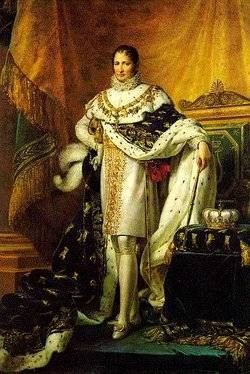King of Naples then of Spain (Ajaccio, January 7, 1768 - Florence, July 28, 1844).

Joseph Bonaparte, (born in Corte, January 7, 1768 and died in Florence on July 28, 1844), lawyer, diplomat and soldier, King of Naples, then King of Spain, is the elder brother of Napoleon Bonaparte.
He was destined for the bar when his brother's elevation called him to public affairs. In 1794, he married Julie Clary (1771-1845), daughter of a merchant from Marseille. They had two children:Zénaïde Bonaparte (1801-1854) and Charlotte Bonaparte (1802-1839).
He was, in 1796, appointed by Corsica as a deputy to the council of the Five Hundred, then sent as an embassy to Rome (1797); but he left this town after the murder of General Duphot, his aide-de-camp. He signed the Peace of Lunéville (1801), and the Peace of Amiens (1802). He received the title of Prince Imperial when his brother had been crowned, was placed by him in 1806 on the throne of Naples, where he made himself loved by the people, without being able to rally the nobles.
As king of Naples, he reformed the monastic orders and reorganized the judicial, educational and financial system. He leaves the kingdom of Naples to his brother-in-law Murat when he is appointed by his brother King of Spain where his attempts at reform had less success and saw himself twice forced to leave the capital, and was reduced to returning to France in 1813 after the defeat of Vitoria.
Lieutenant general of the Empire in 1814 and at the Hundred Days, he constantly clashes with the marshals of the Empire, even the most brilliant like Soult and Masséna, he could not control the events, left Paris at the approach of the allies and accompanied the Empress to Blois. As such, he is one of the main responsible for the failure of French military maneuvers.
After the abdication of his brother, he lived in the United States of America from 1815 to 1832. He lived there under the name of Comte de Survilliers, taking care of agronomy, then he returned to Europe where he lived successively England then Italy.
A wise, good, simple man in his ways. Joseph lacked the quality of the high role that his brother made him play. He loved and cultivated letters; however, it is wrong that he was attributed a poem in 10 songs entitled Napoleon, and dedicated to the hero of his family (this poem is by Hubert-Louis Lorquet, professor at the Île de France, who published it in this island in 1822). King Joseph left Memoirs and a Correspondence, which were published by Albert du Casse from 1852 to 1854 (Paris, 10 volumes in-8), and which throw great light on the history of the Empire.
